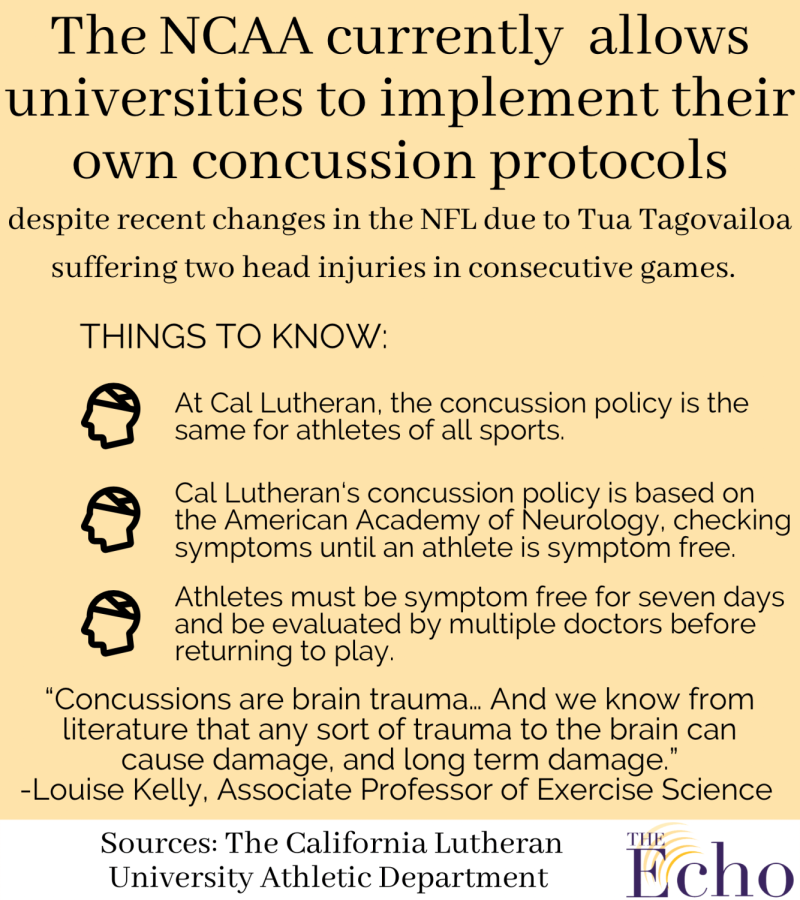Cal Lutheran concussion protocols remain unchanged
October 25, 2022
Following the National Football League’s handling of Miami Dolphins quarterback Tua Tagovailoa where he hit his head in two different games, resulting in a concussion, the NFL decided to modify their concussion protocols. For the time being, the change in protocols will not impact the National Collegiate Athletic Association nor California Lutheran University’s concussion protocols.
The NCAA currently enables universities to implement their own set of rules regarding concussion protocols for athletes, with schools only having to comply with recommendations. At Cal Lutheran, the concussion policy is the same for athletes of all sports. If there is a concussion or any suspicion of a head injury for an athlete at Cal Lutheran, the Athletics Department will go through their evaluation.
“Our concussion policy is based on the American Academy of Neurology…it is checking symptoms until they are symptom free, completely symptom free…we do our evaluation again and then they go through our return to play protocols,” Kecia Davis, director of Sports, Wellness and Performance at Cal Lutheran, said.
The return to play protocols are an extensive seven-day or more period in which athletes gradually build the intensity of training across the seven days.
“By the seventh day if nothing has changed and they have no symptoms, we re-do the evaluation again and then if they pass that, then we will contact our orthopedic surgeon, our doctors, two doctors, and speak with them and say they’ve gone through the whole protocol procedures, and then we return them back to practice,” Davis said.
Louise Kelly, associate professor of exercise science at Cal Lutheran, participated in the NCAA’s concussion study in 2015. This was a longitudinal study that was conducted at 32 universities across the United States and four service academies.
Kelly described what a concussion is and the significance of understanding the dangers of them, especially when they are ignored or go unchecked by the athletes themselves.
“Concussions are brain trauma…and we know from the literature that any sort of trauma to the brain can cause damage, and long term damage. We want to make sure that anybody who has a concussion or who has any sort of brain trauma gets treatment first straight away, and that adheres to whatever the physician or if they are an athlete here in season, what the athletic trainer tells them to do in order to best recover from that trauma,” Kelly said.
Junior defensive end for the Kingsmen football team Jackson White commented on the importance of having thorough concussion protocols at Cal Lutheran, particularly as the gritty nature of athletes make them less likely to stop playing.
“It’s important just to look out for players and to have probably a more extensive protocol because as a football player, we’re tough individuals and we’re not necessarily gonna tell the coaches and trainers that…our head hurts,” White said.
The concussion protocol at Cal Lutheran applies to every athlete, no matter what sport they are involved in.
“If you’re a football player, if you’re a track athlete, if you’re a swimmer, everything is the same,” Davis said.
In light of the recent NFL incident, protecting athletes from concussions is imperative. While Cal Lutheran’s concussion protocols aim to protect student-athletes in the best way possible, Kelly said that there is still a major lack of understanding around the world about what a concussion really is, and called for more research.
“One of the things that we’re really noticing from the CARE [Campus Awareness, Referral and Education] consortium data is just the lack of education all around about what a concussion is…we need much more research on how to treat concussions, and how to educate athletes and non-athletes about what a concussion is so that they can get treatment,” Kelly said.




















